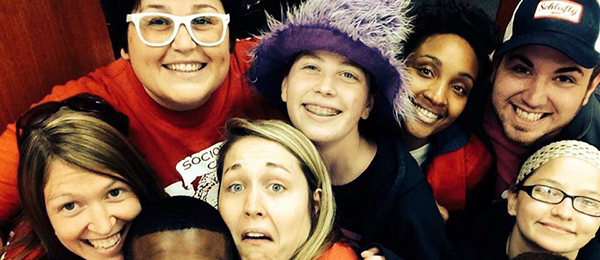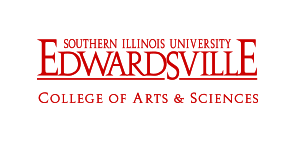|
|
Reflections from the Chair
|
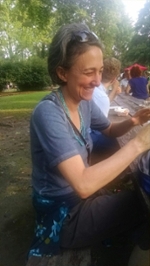 |
|
|
Hello to our alumni!
Whether it's been 25 years or only one year, we are glad to have you as part of our sociology family. For many of you, SIUE has probably changed since the last time you stepped on campus. We have had record enrollments for the last five years. We have had new residence halls built and filled to capacity. And most importantly, we now have not one, but two coffee shops in the University Center!
What's changed most drastically for us, however, is reduced state spending on education. When SIUE began, the University received about 60 percent of its money from state dollars. Today that percentage is about 30 percent and continuing to decrease. Some may be happy that tax dollars are being spent elsewhere, but the truth is that our students must now pay more for a degree that no longer seems like a choice as many employers only hire people with a college degree.
Here in the sociology program, despite these trying economic times, our two main goals remain steadfast.
- We want to teach students to be critical thinkers and life-long learners.
- We want students to leave the program with viable skills that will help them succeed in the market place.
We hope your degree has helped in both these regards, and we would love to hear from you about how it has done so.
We will be sending out these newsletters several times a year to let you know how we're doing. Please email me with stories of how you are doing and how you are using your sociology degree.
We look forward to staying connected with you!
Dr. Linda Markowitz
Chair, Sociology Program
P.S. Check out our website to see more of what we're doing. If you are an alum who would like to be featured, just email me.
|
|
|
|
What's New Around the Program |
|
| |
|
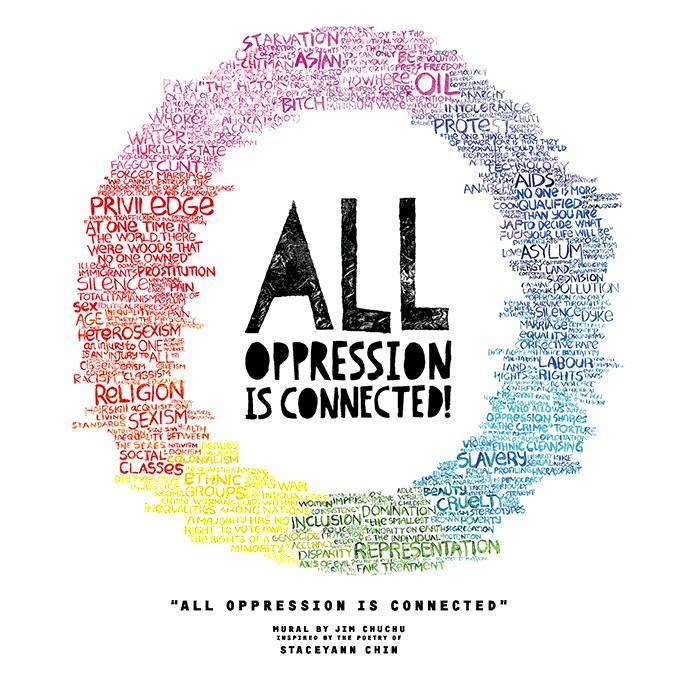
New Specialization in Diversity and Social Justice
Beginning fall 2016, students will be able to complete their degree through a third avenue, a specialization in Diversity and Social Justice (DSJ). Students who wish to take the DSJ route will still take theory, methods and stats, but they will also take classes in community action and social movements, and complete an internship exit requirement in a social movement organization of their choice. We know our students are interested in making positive change and hope the new specialization will give them the skills to begin making those changes, as well as give them a leg up in the job market.
Sociology and Criminal Justice Two Separate Programs
While we are still one department, Sociology and Criminal Justice Studies are now two separate programs. Our Criminal Justice Studies colleagues have done a bang-up job growing and need the space to develop their program further. Dr. Connie Frey and Dr. David Kauzlarich will still teach critical criminology classes, but now those classes will be housed only in the sociology program. With new offerings in Criminal Justice Studies and our own criminology classes, students interested in crime (preventing it not committing it) will have more choices.
|
|
|
Course Bio:The Sociology of Harry Potter |
|
| |
 |
|
|
|
Dr. Flo Maatita came to the department in 2003 and has enlivened departmental offerings in many ways, but none as great as her Socioiogy of Harry Potter Class. Here is what Dr. Maatita says about the class.
I read the first Harry Potter book in 2000, two years after it was released in the US. I was a graduate student at the time and that book, followed by the next one and the next one, became an escape for me as I navigated the stresses of qualifying exams, a prospectus and a completed dissertation. My love for all things Harry Potter continued to grow over time, and that love followed me to SIUE. In 2013, a friend made a simple and obvious suggestion: "Why don't you teach a Sociology of Harry Potter class?" The rest is history.
This class obviously lets me combine two of my greatest loves and joys: sociology and Harry Potter. Because this class is first and foremost a sociology course, we discuss a wide array of sociological concepts, using the world of Harry Potter to illustrate them. We begin by addressing what sociology is and the primary components that comprise social systems, such as culture and technology. Next, we cover a variety of social institutions, like the structure of Hogwarts; issues pertaining to group dyamics, for example house affiliation; and systems of social stratification, like blood status. We then turn our attention to Harry Potter as a cultural and global phenomenon, talking about, for example, whether the books espouse witchcraft or what the books say about religion. To end, we celebrate with Harry Potter themed treats, like the cupcakes you see here (that I did not make).
The course has been popular the past three summers I have offered it. I especially like that students who take the course run the gamut, from the diehard Harry Potter fan to the student who is vaguely aware that there are some movies about a boy wizard and maybe a few books that inspired the movies. Regardless of their degree of familiarity with HP, each term ends with students presenting on their own research, which must be sociological and pertinent to the world of Harry Potter. Students have completed sociological autobiographies on a number of HP characters, examined the centrality of death in the HP world and created sociology courses as part of the curriculum at Hogwarts School of Witchcraft and Wizardry.
I appreciate how students come to understand sociology and think sociologically vis-à-vis the world that J.K. Rowling created. Moreover, I am inspired by the students who get excited at the prospect of thinking about cultural phenomena through the lens of sociology. This excitement is indicative of how our students can gain an appreciation for sociology as something to study and do.
|
|
|
Get to Know Our Faculty: Dr. Kiana Cox |
|
| |
|
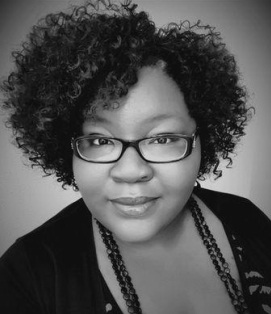 |
|
|
1) Tell us a little about your research.
My research looks at the presence and characteristics of intragroup inequality in social justice movements. Specifically, I investigate the nature of male bias in black anti-racist movements and how it impacts the types of issues that movement leaders think are important. I also conduct research on race, gender and media effects. I examine the ways rap music consumption is related to black youths' gender attitudes and sexual risks as well as the ways that it is related to white youths' endorsement of anti-racist policies and attitudes.
2) What do you find most interesting in your research findings?
In my intragroup inequality research, the most interesting thing by far is the extent to which leaders of black movements use the language of intersectionality to describe black women's experiences. This is the opposite of what black feminist thinkers have historically argued. However, their use of this language does not negate the fact that they still view racism as the primary category of oppression; a view that is always challenged in intersectionality theory.
In the media-effects research, the studies are still ongoing. However, the most interesting thing thus far is the data set. I am conducting a secondary data analysis using the Black Youth Culture data set. It is the first nationally representative data set of Black, Latino, White and Asian youth ages 15-25, and one of the first to ask multiple questions about both gender attitudes and rap music consumption. Historically, research into media, black youth, gender, and sexual risk has been hampered by small, non-representative samples who were asked questions about media products featuring whites. This data set allows us to re-examine these attitudes using culturally relevant media.
3) What do you love most about teaching at SIUE?
I love working with my senior assignment students. In general, I am most passionate about teaching statistics and research methods, so I really enjoy being able to focus that passion in one-on-one settings and support our students as they finish their degrees, not to mention that they also have really insightful research questions. I've worked with students who are interested in racial discrimination at SIUE, the correlates of sports fandom/fanaticism, education policy and college retention, and Instagram and beauty norms for women (to name of few). This semester, my students are working on really exciting projects: racial discrimination in queer organizations, racialized reporting of mass violence, and cultural attitudes toward interracial dating.
4) Do you have any hobbies that keep you busy when you’re not working?
I am a huge sports nerd. I was born and raised in the Bronzeville area of Chicago, so I have been a White Sox fan and a Bulls fan since birth. My DVR is filled with shows featuring sports opinion and analytics. For my Chicago fix, I watch Sports Talk Live, and my favorite national ESPN shows are Highly Questionable, First Take, and His and Hers. Recently, I have been following Serena Williams' historic path to becoming the greatest female player in tennis history. As such, I have developed a new interest in watching (and eventually playing tennis).
5) What’s your favorite restaurant in the St. Louis area?
I don't get over to St. Louis much. However, Cleveland Heath, Gulf Shores and Social Gastropub are my Edwardsville favorites.
6) We know you’re from Chicago, which pizza do you like better? Chicago or St. Louis style?
Easily, Chicago style. Chicago stuffed pizza is its own food group. I've been to a couple of local pizzerias that have a "Chicago style" on their menu, but it's not close. Good pizza, but not true Chicago style.
7) Anything else we should know about you?
Other than sports, cooking really tough dishes is one of my hobbies. Often, if I go to a restaurant and enjoy a meal, I will go home, search for the most authentic recipe online and try to make it. I tend to do a good job. Most recently, I've been making pad thai at home. My next big project (thanks to my favorite chef show, Top Chef) is to make an entremet, a multi-layered french cake. The difficulty level is high because it calls for multiple pastry techniques (mousse, sponge cake, crisp wafers, cremeux pudding, fruit glaze). I'll wait for Spring Break to try that one! Ironically, the one recipe where I consistently fail? Chicago style pizza! Apparently, I can't duplicate it either.
|
|
|
Graduate Student Showcase: Shevontae K. Harris |
|
| |
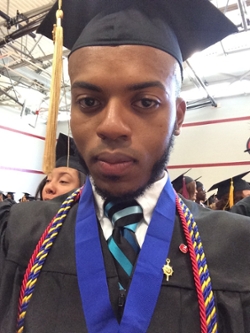 |
|
|
|
I’m currently in the second year of the sociology master’s program, along with being a graduate assistant and supplemental instructor for the undergraduate dociology methods course. I love to learn, teach and complete social science research, including qualitative and quantitative methods. Throughout my undergraduate career, I majored in sociology and minored in African-American/black studies. With much inspiration from critical race and black feminist perspectives, I was inspired to research salient issues pertaining to gender (masculinity) and sexuality amongst black males.
I am currently working on my thesis, in which I am studying the intersectionality of race, gender and sexuality pertaining to the lives of African-American men who identify as heterosexual or gay, bisexual, transgender, queer, and/or intersex (GBTQI). I am assessing how various life experiences and social environments create levels of resistance, knowledge, and/or ignorance regarding sexual identities of African-American men with varying age, class and educational levels. I will also focus on compulsory heterosexuality and the marginalization of GBTQI sexual identities within Black communities.
While finishing my sociology degree, I decided to pursue a second master's within the integrative studies program, with a diversity training emphasis. Combining my training in sociology and diversity training, I plan to pursue a career as a diversity trainer within organizations, including universities. Using my sociological lens, I want to create diversity and inclusion programs, as well as college–level courses to educate people about the importance of diversity within their lives, workplaces and other social environments.
|
|
|
Meet an Alum: Anita Kolesa |
|
| |
|
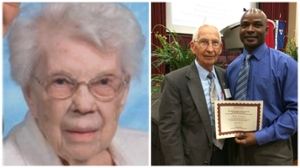 |
|
|
We honor Anita Rogers Kolesa, who died in 2014. Anita graduated from the sociology department in SIUE's early days and received her master's degree in sociology from St. Louis University. After leaving the department, Anita dedicated her working life to the field of social work, always bringing in her sociology to her experiences. Most of Anita's work life was with Travelers Aid in New Orleans, but her work assignments took her to South Korea where she worked with the adoption of orphans. Anita also was involved in the Vietnam refuge relocation program. In honor of his wife and her passion for community engagement, in 2015 Thomas Kolesa began the Kolesa award, an award that is given to an SIUE sociology student committed to community work. The sociology program was honored last year when Thomas came to SIUE Honor's Day, with many of his family members, to see the award given to Rickie Jackson. Thomas, in his 90s, drove all the way from Louisiana by himself to see Rickie receive the award.
|
|
|
Senior Showcase: Abigail Hall |
|
| |
|
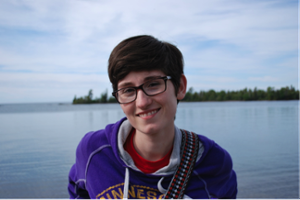
All students leaving the sociology department get to complete their very own research project. The students spend an entire year crafting a question, thinking about theory, developing methods, collecting data and analyzing the findings. The task is difficult to be sure, but our students are definitely up to the challenge. We'd like to introduce you to one student: Abigail Hall. Abbie is grappling with the tough question of sex education. Here's what she says about her project, titled, "Teaching Sex in High School."
"The driving question of my research project is: How is sexuality education taught in public high schools in Illinois? Ultimately the goal of this research is to gain a deeper understanding of the following questions.
- How is consent being taught?
- Is there evidence of a hidden curriculum pertaining to heteronormativity and consent?
- How do educators describe their experiences as sexuality education teachers?
In order to fully understand this topic, feminist theory, queer theory, and dramaturgy will be used to guide this research and interview questions and help inform the findings. The methodology for this study involves interviewing people currently teaching sex education about their experiences as educators and discussing the various topics they taught."
|
|
|
|
